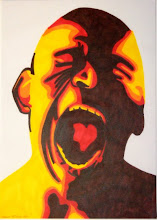
Cinematic Excess
(response again to an exam question asking what the role of "cinematic excess" is in modern cinema)
The atypical Hollywood narrative structure means to be as readable and stimulating as possible. We are all aware of this, and fall victim to it, switching off for a little more than an hour, behind our popcorn jacouzzi and our odd footing that cuts off toe circulation whilst we're wedged between the duplex soft-chair armrest zones. It is obvious then, in discussing the role of "Cinematic Excess" (in these well defined structural boundaries), that the two (convention and excess) are destined to conflict!!!!
(F***ING DUH).
(*ahem) With "Cinematic Excess," the plainly material and objective nature of all the elements of a film can be interpreted as "subjective," and makes it a very 'opinionated' argument whether or not a specific film falls victim to such awesomely intellectual critical categories (*cough*).
However, on the basic level, Cinematic Excess (that is, things that are labeled as such) usually rings loud and clear to the viewer or critic simply because it defies the structure most familiar to modern cinema (the Hollywood schtick, one would say).
It is clear, therefore, that like most "movements" or "rebellions" against a tradition or a strict coda, an ebb and floe soon will be produced that undulates between the two opposing points on the spectrum. Eventually, aligning with the cyclical nature of any political or hierarchical structure (which film in a lot of cases certainly represents,) that which is 'revolutionary' solely because of its counteraction of the 'evils of normalcy' within our typical parameters, tragically ceases to be revolutionary after a certain amount of overstudy and varying disagreements. The applicable revolutionary idea made pertinent to defying this societal structure is nevertheless inevitably adapted directly into the same system it initially rebelled against.
An "obtuse narrative structure"* (according to Roland Barthes) is a lengthy of saying the above. Usually, the 'obtuse' label marks that a film is the offspring of the fundaments beneath the above process (that is, the essentials of the typical Hollywood narrative.) Elements or structures that do no fit (such as rearranged chronology, unconventional composition, a spoken or textual approach to storytelling, or most commonly an extreme sense of style exuded from the filmmaker) or that are regarded as "Cinematic Excess" have slowly been transmogrified into working neo-tropes within the Hollywood labyrinth, which they previously riled against.
In a nutshell, what's different is so cool, that it becomes cool and marketable to seem 'different' and the entities that the "different" strive to segregate from themselves in turn absorb that 'angst' and 'nonconformist behaviour' into their condescending, subversive, capitalistic vocabulary.

1 comment:
you were totally on drugs when you wrote this.
Post a Comment